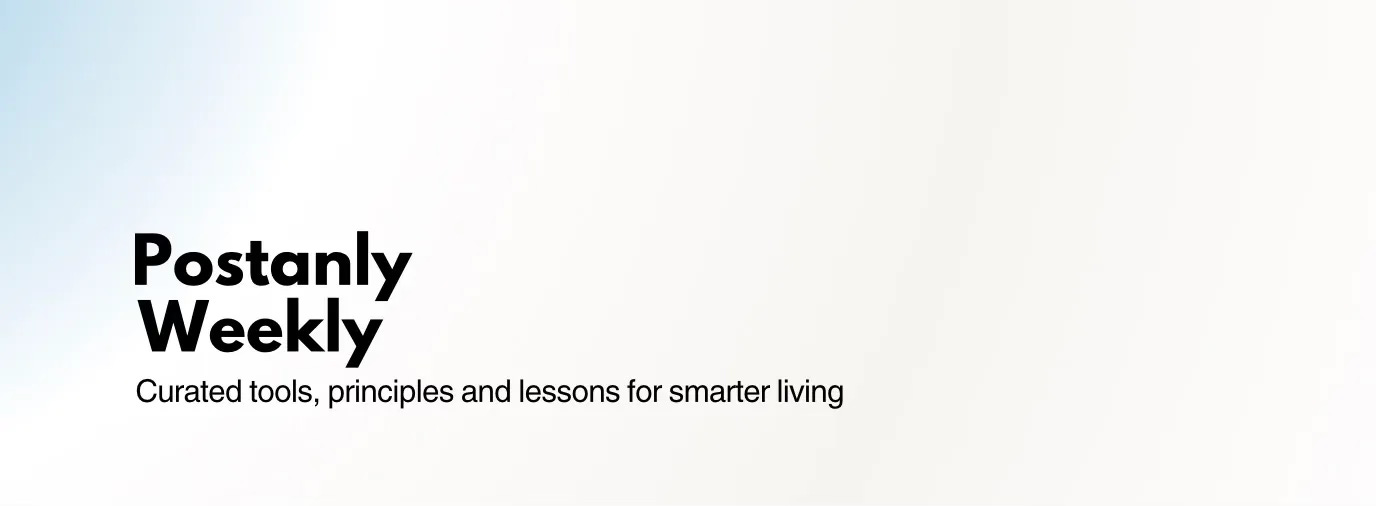Nietzsche: To do is to be
The view from above – stoic wisdom to rise above chaos
Hello everyone,
Postanly Weekly is a reader-supported smarter living newsletter. To support my work, you can upgrade to a paid subscription for $7 per month or $40 for an entire year. With a modest yearly contribution you’re not only helping keep Postanly Weekly going, you also get free access to Thinking Toolbox (mental models for life) and Mental Wealth Toolbox (practical concepts for smarter decisions). Christmas discount: 50% off today (get free instant access to Thinking Toolbox (mental models for life) and Mental Wealth Toolbox.
Use this special link or the button below.
In partnership with American Writers and Artists Institute
Did you know… There’s a little-known way to get paid amazingly well to tell a unique kind of story? It’s only 2 pages at most. Thousands of companies are paying writers $1,500 on average to write it for them.
It’s all detailed in a short guide you can download immediately.
To be alive is to create your own reality
Humans are driven by three fundamental impulses: we want to thrive, survive, and have a fulfilled existence. These are the three pillars on which our existence rests, and they are all connected.
Nietzsche’s famous quote, “to do is to be,” touches on the essence of being alive. At first glance, there’s nothing particularly original about the German philosopher’s ideas on authenticity.
In fact, it would be fair to say that he’d been saying much of the same for most of his career. For example, Nietzsche was an early critic of modern art and culture as he felt they had robbed people of their ability to discern high-quality works from low-quality imitations.
He saw this as an attack on “naturalness” and “simplicity” by what he called our “artificial man.” Nietzsche believed that our modern world was destroying natural human instincts because artificiality alienates us from nature and prevents us from living authentically.
Friedrich Nietzsche was a German philosopher, cultural critic, and poet of the late 19th and early 20th centuries. Nietzsche is known for his critique of traditional morality and religion and his ideas on the concept of the “superman” or “Übermensch.”
He thought traditional morality and religion stifled individual freedom and creativity and argued that true freedom could only be achieved by individuals who could transcend these constraints and create their own values.
He believed the relationship between action and existence determines who we become. He thought people should focus on becoming themselves fully and not just on being or mere existence.
The relationship between action and existence
Nietzsche’s quote, “to do is to be,” refers to the ideas of Socrates and Plato on the relationship between action and existence. Socrates also said, “to do is to be. He believed that doing is equivalent to being and that taking action is the same as having a certain kind of existence.
Plato, on the other hand, believed that being is equivalent to doing, that is, that existing in a particular state is the same as taking a certain kind of action. “To be is to do,” he said.
Nietzsche suggests that there is a difference between the two philosophers’ views. While Socrates believed that action is the defining feature of existence, Plato thought existence itself is the defining feature of action.
The statement “To do is to be” can also be interpreted in a more existential sense, suggesting that taking action and making choices gives our lives meaning and purpose. Without action, we would simply exist without any sense of self or identity.
In contrast, “To be is to do” can be interpreted as the idea that our actions shape our existence and identity. We become who we are through the things we do and the choices we make. “To do is to be” is a concept that has been around for centuries, and it speaks volumes about your life’s purpose.
The essence of living well
In his masterpiece, On the Genealogy of Morals, Friedrich Nietzsche argues that the key to morality is self-affirmation or affirmation of one’s life. In other words, being moral isn’t about what you do but who you are. He elaborates on this thesis by arguing that the essence of living well is doing what you love and taking pride in your work.
This implies an uncompromising attitude towards one’s actions — anything less than wholehearted engagement with the things that matter to you is a betrayal of your values and subversion of your true self.
Nietzsche explains: “If, in all that you wish to do, you begin by asking yourself: am I certain that I would wish to do this an infinite number of times? This should be for you the most solid centre of gravity . . . My doctrine says, the task is to live your life in such a way that you must wish to live it again — for you will anyway! If striving gives you the highest feeling, then strive! If rest gives you the highest feeling, then rest! If fitting in, following and obeying give you the highest feeling, then obey! Only make sure you come to know what gives you the highest feeling, and then spare no means.”
“To do is to be” also means choosing to do your best to live a life full of zest, action and passion. It implies that we would simply exist without any sense of self or identity without action.
In other words, our actions define who we are and give our lives significance. In other words, our actions define who we are and give our lives significance. This statement is a call to take initiative and to actively engage in the world rather than simply existing passively.
To be active is to create your own reality
“No one can construct for you the bridge upon which precisely you must cross the stream of life, no one but you yourself alone,” says Friedrich Nietzsche.
“To do is to be” also highlights the importance of agency and its role in shaping our lives. When we take action, we assert our agency, making choices and decisions that shape our experiences and understanding of ourselves and the world around us.
By taking action, we are actively creating our own reality rather than being passive recipients of the circumstances of our lives.
“To do is to be” also emphasises the idea that we are not simply passive observers of the world but active agents who can shape and change it. By taking action, we are creating our own lives and contributing to the world meaningfully.
We can only be ourselves if we act in accordance with our genuine values, goals, beliefs and core truths. Hence, the phrase “action speaks louder than words” (our actions and experiences) has a much more significant impact on others and the world around us than our thoughts ever will or could.
Nietzsche encourages us to be proactive, make choices, and act to live fulfilling and meaningful lives. Overall, Nietzsche suggests that both action and existence are essential and are intertwined in a complex way.
Food for thought
The “view from above,” the wisdom of stoic philosopher Marcus Aurelius, is how I shrink my problems and expand my perspective. As a Roman emperor, Aurelius had to deal with constant warfare, devastating plagues, and treacherous plots within his own court. His secret weapon to make sense of it all without losing his mind was what he called the ‘cosmic perspective,’ a way of seeing things from a detached view.
A Concept worth understanding
Time-discounting
Time discounting is essentially a way of valuing things differently based on when they occur. It's like saying, "I'd rather have a dollar today than a dollar a year from now," if you prefer immediate rewards over delayed ones.
You see, time discounting reflects the fact that we often place a higher value on things in the present compared to the future. It's not just about money; it applies to various aspects of life. For instance, if someone offers you a choice between a piece of cake now or a whole cake a week later, you'd likely choose the immediate slice, right? That's time discounting in action.
But there's a catch: the extent to which we discount the future varies. Some people are really impatient, valuing the present significantly more, while others are more patient and willing to wait for greater rewards down the road.
Time discounting isn't inherently good or bad, but it can influence our decision-making and financial choices. It's a personal bias that can have both positive and negative effects, depending on the context.
Time discounting is closely related to the concept of "opportunity cost."
They say, "A bird in the hand is worth two in the bush." We prefer immediate gains because we can be certain of them, rather than potentially larger but uncertain gains in the future.
This can affect many aspects of life.
Being aware of this bias can help us make more informed decisions that align with our long-term goals and values. It's all about finding the right balance between enjoying the present and securing a better future.
So, in a nutshell, time discounting is about how we weigh present and future rewards. It can lead to impulsive decisions, but it's also a useful concept to consider when making choices that impact our financial and personal well-being.
James Clear on working on hard things and having fun:
“When you’re doing something hard, focus on the fun part.
Many people make a subtle mistake, which is they emphasize how difficult it is to do something. They tell themselves writing is hard or running is hard or math is hard. And so on. The dominant thought in their mind is that this is hard to do.
And it is true these things (and many others in life) can be challenging.
Meanwhile, people who thrive in a given area are often emphasizing a completely different aspect of the experience. They are thinking about how it feels good to move their body rather than telling themselves exercise is hard. Or, perhaps, they aren’t really thinking much at all. They may slip into a trance during their run, a meditative rhythm.
But what they are almost certainly not doing is repeating a mental story about how hard it is to do the thing. Their dominant thought is about some element of the experience they enjoy. They are working hard, but with the fun part in mind.”
> My best newsletter recommendations
Check out our favourite picks → Topics covered: learning, finance, starting up, productivity, technology, career, better living, seo, venture capital and more.
Selected newsletters for Postanly readers
An App I’m Enjoying
Meco— Read all your awesome newsletters on a single app. Meco is a distraction-free space for reading and discovering newsletters, separate from the inbox. Add your newsletters in seconds and liberate your inbox.
Move your newsletters to a space built for reading and declutter your inbox in seconds. Enjoy newsletters in a space designed for reading. It’s a time saver for writers and newsletter readers.
Thanks for reading!
Until next week,
Thomas
Medium | All Courses | The Write Life | Philosophy For Modern Life
Postanly Weekly is now a reader-supported publication. To support my work, you can upgrade to a paid subscription for $7 per month or $40 for an entire year. With a modest yearly contribution you’re not only helping keep Postanly Weekly going, you also get free access to Thinking Toolbox (mental models for life) and Mental Wealth Toolbox (practical concepts for smarter decisions).
Christmas discount: 50% off today (get free instant access to Thinking Toolbox (mental models for life) and Mental Wealth Toolbox.
Use this special link or the button below.



